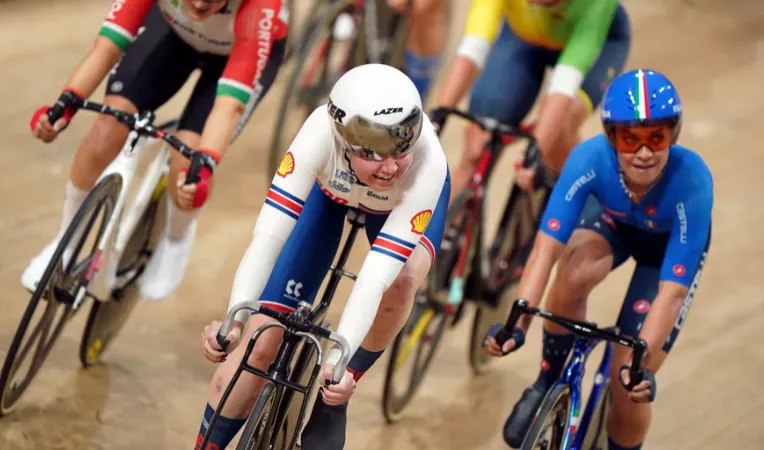As Katie Archibald prepares to compete for Great Britain at the World Championships in Ballerup, Denmark, she candidly reflects on the deep contrast between her professional success and the profound personal grief that continues to shape her life. The two-time Olympic gold medalist, known for her dominance on the track, has endured a series of traumatic events that have deeply affected her outlook on both sport and life.
Sitting in the stands of the Manchester Velodrome, Archibald, now 30, watches her teammates blur past during practice for the championships. She will compete in the women’s team pursuit and the Madison—an achievement in itself, considering the events of the past year.
In June, while training for what was expected to be a triumphant run at the Paris Olympics, Archibald suffered a serious injury. A freak accident in her garden saw her dislocate her ankle, break both her tibia and fibula, and tear ligaments from the bone. The setback crushed her hopes for Paris, yet it pales in comparison to the loss she experienced nearly a year earlier.
In August 2022, her partner, Rab Wardell, a celebrated mountain biker, died suddenly from a cardiac arrest just days after winning the Scottish Championship. Archibald still struggles to process the loss. “Rab died yesterday morning. I still don’t understand what’s happened; if this is real,” she wrote in a heartbreaking social media post soon after. “He went into cardiac arrest while we were lying in bed… his heart stopped and they couldn’t bring him back. Mine stopped with it.”
Recalling her injury in June, Archibald remains unfazed by the idea of missing the Paris Games, despite the disappointment of others. “The amount of people who said, ‘I’m gutted for you,’ made me realize that it didn’t touch the sides,” she reflects, pausing to control the emotion welling up as she inevitably compares the accident to the immeasurable pain of losing Wardell.
Before Rab’s death, Archibald was already grappling with anxiety. A crash in June 2022, where she was thrown over the bonnet of a 4×4, left her with two broken ankles and lingering mental scars. “I really struggled after that,” she admits, the weight of her anxiety compounding.
But when Rab died, her perspective on fear shifted dramatically. “I went out on the bike maybe three days post [his death] and I noticed that the vice wasn’t around my chest. I couldn’t imagine feeling panicked anymore because I was just devastated,” she says. The grief, all-consuming, left no room for the fears that once paralyzed her on the bike. “There is nothing that hurts as much as that,” she says softly, wiping away tears.
Archibald’s resilience shines through as she continues to speak, regaining composure with a smile. I think I just didn’t have enough coffee this morning,” she jokes, showing the same spirit that carried her from her early days in cycling to the pinnacle of her sport.
She fondly recalls her introduction to cycling as a rebellious teenager with pink hair and piercings. Racing against older men on grass tracks in the Highland Games, she quickly fell in love with the sport. After finishing her A-levels, she worked briefly at her father’s bedding company before committing to cycling full-time, joining the GB Academy in Manchester at just 19.
“There was no sense of threat. It was all opportunity,” she recalls. The chance to pursue cycling as a career, with the possibility of competing in the Glasgow Commonwealth Games and eventually the Olympics, was too exciting to pass up. By the end of 2013, she had already helped set a world record alongside Laura Trott, Dani King, and Elinor Barker, winning gold at the European Championships.
Archibald’s journey since has been marked by tremendous success. She became a key figure in British cycling, winning multiple world titles and Olympic medals. But her injury earlier this year cast doubt over her future ambitions. As she recounts the moment she fell in her garden, her disbelief is palpable. “It’s funny, but lying on the ground, the words, ‘Oh, I think it’s bad,’ came out of my mouth like someone else was saying them,” she recalls.
Her injury was severe enough that doctors warned of potential long-term consequences if left untreated. Fortunately, she received quick medical attention, but the incident highlighted the thin line between career-threatening injury and recovery.
Now, as Archibald returns to racing, her focus has shifted. Despite the physical and emotional challenges, she remains committed to her sport, with one eye on the 2028 Los Angeles Olympics.
The balance between personal loss and professional drive defines her outlook today. “My job satisfaction is a 10,” she says. “The rest of my life is definitely not.” Still, through cycling, she finds a way to channel her grief and rediscover her strength.
Katie Archibald’s journey continues—one of resilience, determination, and a heart that races forward, even through the heaviest of losses.

